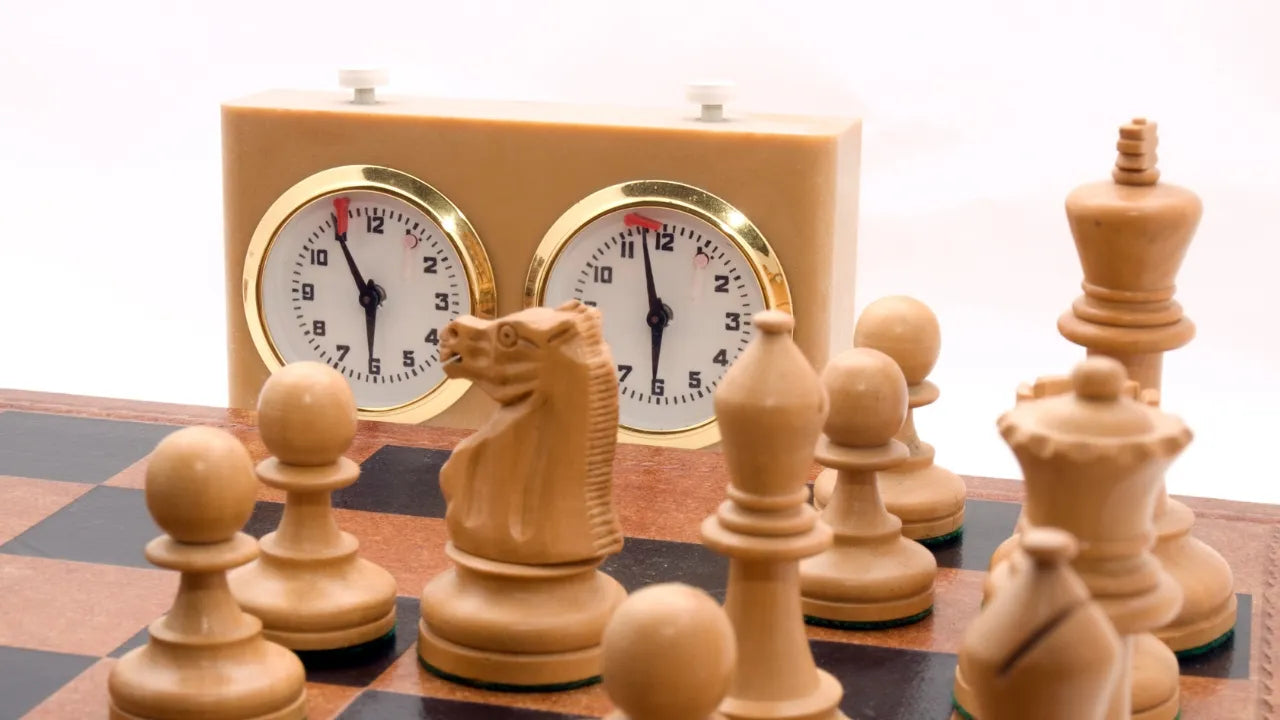The Chess Clock: Why Timing is Everything in Chess

If you’ve ever played a casual chess game with that one friend who takes forever to make a move, you’ll understand why chess clocks exist. Before timers were introduced, some games lasted so long that spectators aged visibly, and tournaments dragged on for weeks. Imagine waiting an hour just for someone to decide between moving their knight or bishop—talk about test of patience!
But then, chess clocks came to the rescue. They keep things fair, fast, and thrilling, forcing players to balance thinking time with smart decision-making. Whether you’re playing blitz, rapid, or classical chess, a good chess timer is an essential tool for every serious player.

The Birth of the Chess Clock
Back in the 19th century, tournament games had no time restrictions. Players could take as long as they wanted, and trust us—some took full advantage of that. Enter Sand Clocks, the first attempt at keeping games on schedule. However, they weren’t ideal since sand isn’t exactly the most reliable timekeeper.
Then came the mechanical chess clock in the late 1800s, which worked like a stopwatch. Each player had a button to stop their clock and start their opponent’s. The idea was simple: if you ran out of time, you lost. The legendary Wilhelm Steinitz and Johannes Zukertort were among the first to play with these clocks in the 1886 World Chess Championship.
Fast forward to today, and we have digital chess clocks with all sorts of settings, including increment time (extra seconds per move) and delay timers. Chess technology has truly come a long way!

Why Use a Chess Clock?
1. It Keeps the Game Fair
Without a chess timer, one player could think for hours while the other rushes their moves out of boredom. A clock ensures both players get an equal amount of time to think. If your time runs out before you make all your moves, you lose. Simple, fair, and effective.
2. It Teaches Time Management
A chess clock forces players to plan ahead and use their time wisely. Imagine being ahead in material but with only 10 seconds left—panic mode! Learning to balance thinking time is just as crucial as knowing openings or endgames.
3. It Makes Chess Exciting
Some of the most thrilling chess games happen in time trouble—when both players have seconds left on the clock, frantically blitzing moves. This adds drama and suspense, especially in blitz chess (5-minute games) and bullet chess (1-minute games).
4. It Prepares Players for Tournaments
If you ever dream of competing in FIDE tournaments, you’ll need to master the chess clock. Competitive chess uses strict time controls, and you don’t want to be that person who loses on time because you forgot to hit the clock.
Types of Chess Timers
1. Analog Chess Clocks ⏰
These are the old-school, ticking clocks with dials. They have a classic look and a nostalgic feel, but they don’t allow for modern time controls like increments. Still, they’re great for casual play!
2. Digital Chess Clocks 🖥️
These are the standard for professional chess. They display precise seconds, allow custom time settings, and even beep when your time is low (stressful, but helpful!). Popular brands include DGT clocks and Chronos clocks, often seen in official tournaments.
Check out here: Digital Professional Chess Clock
Pros and Cons of Using a Chess Clock
| Pros | Cons |
| Keeps the game fair | Adds time pressure |
| Prevents long, boring games | Can lead to blunders under pressure |
| Helps with time management skills | Some clocks can be expensive |
| Makes the game more intense | Not ideal for super casual games |
Conclusion: Tick-Tock, Make Your Move!
A chess clock isn’t just a timer—it’s an essential tool that adds fairness, excitement, and challenge to the game. Whether you’re playing casually with friends or aiming for a FIDE title, learning to manage time is a crucial chess skill.
So next time you play, grab a chess timer, hit the clock confidently, and don’t let time slip away—your move! ♟️⏳


Leave a comment